CONVERSATIONS WITH SAI
Satyopanishad - Part 27
Direct Directions from the Divine
Dear Reader,
In response to your positive feedback to this section where we have a conversation with the Divine, we continue with Prof. Anil Kumars Satyopanishad following Dr. John Hislops series Conversations with Bhagavan Sri Sathya Sai Baba that ended in January 2008.
This series is also in the question-answer format that many devotees prefer, and has answers from Bhagavan on topics as wide ranging as the origin of evil, the goals of human life, and aspects of God embodied and formless, to price hikes, womens liberation, vegetarianism, and the generation gap among people of the present times.
Published in two parts by the author, these volumes have 270 questions in all, which are neatly grouped under separate chapters. In this issue, we continue chapter seven, Sadhana, The Inner Door.
CHAPTER VII:
Sadhana, The Inner Door
Prof. Anil Kumar: Swami! What are the sources of our peace, happiness, wealth, comforts and conveniences? How do we get them? Why are some denied these most coveted things?
Bhagavan: You don't get anything in life for nothing. One gets these things in life because of any one of the following three reasons. Take one simple example: You know banking. You are an account holder. Suppose you want some money. What should you do? You go to your bank and get the amount. But you should be having enough money to your credit and by submitting a cheque, affixing your signature you can withdraw the money you want.
If you have nothing to your credit in the account; you don't get any money. Yet, you need money. How to get it? If you mortgage your permanent assets like gold or landed property, the bank will give you some money proportionately. You may not have permanent assets. Still you want money. Then, if a rich man stands as a surety or guarantor, the bank will give you the amount you need. Thus, these three are ways of getting money from the bank.
 |
 |
 |
Here money is God's grace. If you are doing some good deeds in the present i.e. depositing some amount of money in your account, you can withdraw the money of God's grace in the future. If in the present there is no such credit, at least the good deeds you did in the past, that is to say, your permanent assets when mortgaged to the bank, entitle you to receive money. Without these two good acts you may still be eligible to draw money from your bank if a rich man i.e. God or an Avatar or a Sadguru stands as your guarantor.
So, you receive God's grace either because of your past merit, or present merit, or if a rich man stands as a surety or guarantor. There is no other way. These are the reasons for a person's affluence, luxury, life of happiness, comforts and conveniences.
Prof. Anil Kumar: Swami! You tell us that we are not mrnmaya (dust thou art), but chinmaya (you are awareness). Therefore, we devotees should know that we are not simply the body, but awareness. You also repeatedly say, You are God. Then, when I am God, aham brahmasmi, why should I pray? Where is the need for all this spiritual exercise, then?
Bhagavan: whether you know, agree and believe or not you are God indeed. "Mamaivamso jivaloke.," said Krishna in the Gita, which means "You are Mine, you are the spark of My Divinity."
The three divine attributes sath, being, chith, awareness, and ananda, bliss are in you. Prajna, conscience in you is divine. So, it is said, prajnanam brahma. The great mahavakya, the supreme statement, also says, tattvamasi, That thou art.
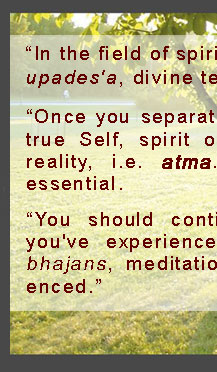 |
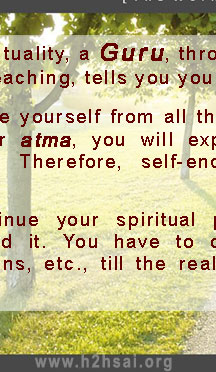 |
 |
We have today intelligent people who observe plurality or multiplicity in unity. But good, noble, and pious persons who find unity in diversity are rare. Once it so happened that a little tiger cub got mixed up in a flock of sheep. Thus, moving about with the group for some time, the cub thought that he was also like the sheep and belonged to their families.
One day a tiger came that way and attacked the sheep. On seeing the tiger, the cub started shivering, and said, "Oh! Don't kill me. I am one of the sheep, after all, so weak". Then the tiger spoke to the cub, "Why do you fear? You are not one of the sheep. You are a tiger. Come on! Follow me.
Look into the river and see your reflection there in this water and compare your figure with mine. You will find the same stripes on the coat of your body, a moustache on your mouth and a roaring sound in your voice. Why do you think you are one of this flock of sheep. Oh dear one! You have forgotten your true identity and nature". The cub then realised its true nature and abandoned fear from its mind.
Similarly, in the field of spirituality, a guru, through his upades'a, divine teaching, tells you your true identity. Once you separate yourself from all that is not your true Self, spirit or atma, you will experience your reality, i.e. atma. Therefore, self-enquiry is very essential. I say "You are God" but this truth has not come into your experience. You should continue your spiritual practice until you've experienced it. You have to continue your bhajans, meditations, etc., till the reality is experienced.
Prof. Anil Kumar: Swami! By now we have known about divinity very well. What more do we need in this world?
Bhagavan: You are mistaken. It is not enough if you merely know. If you spend your lifetime reading books when are you going to experience bliss? It is experience which is important and not bookish or scriptural knowledge. The Gita refers to three specific steps in spirituality, jnatum, knowledge, drastum, sight and pravestum, experience.
Suppose you want to eat a delicious item. What do you do first? For example, you know about the delicacies kurma and pulao. Then in the next step, these two items are to be served in a plate. It is not enough if you know(jnatum) the items and see them (drastum). You have to eat and enjoy the dishes (pravestum) and experience.
Mere information and knowledge are useless. You should practice and realise. This is wisdom and when you attain it, you find yourself immersed in bliss and you remain speechless.
 |
 |
 |
The same thing has been explained in the Brahma sutras also. The first principle is: athato brahma jijnasa which means, athato, hereafter, brahma, about God, jijnasa, developing interest. But what is meant by 'hereafter'? When exactly should we develop interest in Brahman? This word "athato", is interpreted in several ways by scholars and visionaries; they run to volumes. But what is first needed is karma jijnasa, interest in action, later dharma jijnasa, interest in discrimination, and finally brahma jijnasa, interest in divinity.
Here is a simple example: Suppose you want to eat coconut chutney. What do you do first? You procure all the material necessary for its preparation; this is karma jijnasa. You should grind all the material so procured nicely; this is dharma jijnasa. You have to keep it on the tongue to decide the taste and to know if anything else should be added to it; this is brahma jijnasa. This means mere karma jijnasa is not enough. You need at the next stage, dharma jijnasa and finally, you develop interest in Brahman, brahma jijnasa. The wisdom so gained must be practised and experienced. You should share the bliss with others.
Prof. Anil Kumar: Swami! We do both good and bad deeds. Don't our good actions nullify the evil effects of our bad actions? Don't they at least balance each other? In other words, will our good actions cancel the bad effects of our misdeeds?
Bhagavan: You are thinking like a Commerce student, along the lines of credit and debit. But, God is a Super Divine accountant. His balance sheet is not of your type. He will make you face the consequences of your actions, good for good actions and bad for bad actions. He will not add or subtract any of the consequences of your actions.
A small example: Suppose you have some seeds of both thorny plants and fruit-bearing trees. What happens when you sow them? The seeds of the thorny plants germinate into thorny bushes while the seeds of the fruit-bearing trees grow into fruit- bearing ones. Germination will never happen in any other way. The same is the case with your sinful deeds and the meritorious.
 |
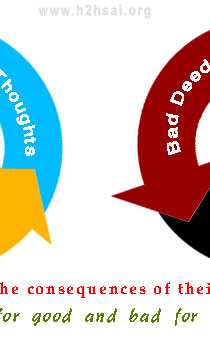 |
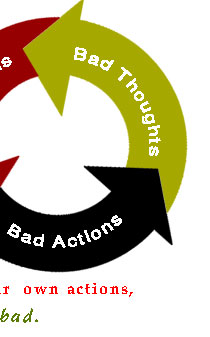 |
You must have seen persons who vow to offer ten thousand rupees to Lord Venkateshwara if they win a lottery of ten lakhs. Can't they understand that God, who can give you ten lakh rupees, doesn't expect your ten thousand rupees? They don't think reasonably and logically. People think according to their worldly standards. But, Swami wants you to spiritualise your mundane actions as well.
Prof. Anil Kumar: Swami! Is it not enough if we are good? How can we know God?
Bhagavan: Remove one o from 'Good'. If that extra o, prakruthi or body feeling is given up, it becomes God. You know the letter "W". It is double 'you', i.e., the individual soul, jivatma, and the cosmic soul, paramatma. It is the illusion, maya, that prevents you from knowing the unity of the two. If you repeat "my" a couple of times, it will sound like "maya".
 |
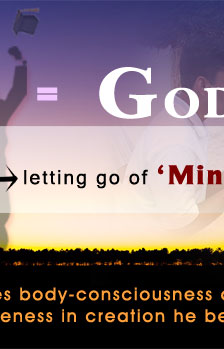 |
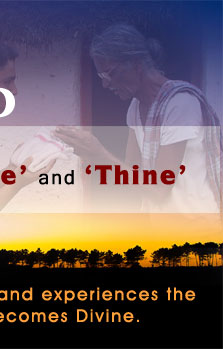 |
It is the feeling of 'mine' and 'thine' that is responsible for all the miseries of the world. You are least disturbed if your neighbour's car is damaged. But if there is a slight scratch on your own vehicle you are much worried. If your neighbour sells or disposes off his house it matters nothing to you. But if circumstances force you to sell off your own home, you feel very sad. Why? The feeling "this is my house", makes you sorrowful. This feeling of 'mine' is maya. If this is gone, you will experience unity in diversity.
Prof. Anil Kumar: Swami! It is said that we can't escape from the consequences of our actions. Why do we find some wicked people happy in spite of their treacherous deeds?
Bhagavan: Here we should note one important point. You say some wicked people are happy. They may do all the misdeeds smiling, but later they have to cry and suffer.
Some actions give results immediately, while others take a long time. Here is a small example: If a blade cuts your finger, blood gushes out immediately; this is an action that gives result immediately. To draw milk from the udder of a cow it takes some time; this is the second category of action. It takes food a few hours to be digested; this is the third category of action.
"Punarapi jananam punarapi maranam punarapi janani jathare s'ayanam" (life is a continuous cycle of repeated births and deaths). After death one has to go back to the womb of the mother and be born once again. It is only life after life. But spirituality helps you, so to say, not to be born. Having departed, you don't have to die once again by having another birth. You take medicine so that you don't have to fall sick once again. Death should take you to immortality. |
If you sow a seed, it takes a long time to germinate and grow into a plant. So also your actions give results at different points of time. It is all a question of time. One must necessarily face the consequences of one's own actions without fail.
Prof. Anil Kumar: Swami! Since all forms and names are Divine, what is the need then for the Lord to incarnate in human form?
Bhagavan: You do not know until I tell you that all forms and names are His. You need to be told of the Divine nature i.e., sath, being, chith, awareness, and ananda, bliss. This is the purpose of incarnation. God in human form is the embodiment of love. He teaches and makes everyone experience love.
Though flowers, thread and a needle are present,
Don't you need someone to make a garland?
In spite of gold and pearls being available,
Shouldn't you have a goldsmith to make a chain?
The wick, container and oil will not give light
Unless you light the lamp, will they?
Avatar, God incarnate, sets an ideal for the entire humanity. There is nothing He needs in this world as everything is His only.
Prof. Anil Kumar: Swami! We feel that life is going on and on; but it sounds purposeless and aimless. Kindly tell us about the purpose of life.
Bhagavan: 'Yecata nundi vachitivo achatikeguta naijamu pranikotikin' You should go back to the place of your origin. Truly, you should know that you are from God and should go back to God.
A pot, a slate, etc., can be made out of clay. Suppose you have a pot. After using it for some time, you drop it by accident. It falls to the ground and breaks into pieces over which several automobiles pass crushing them further.
So what happens then? You get the clay back again. Earlier it was clay and at the end it is clay again. The pot also is made of clay. Similarly, you are from God, bound to God and are God as well. Realisation of this truth is the purpose of life.
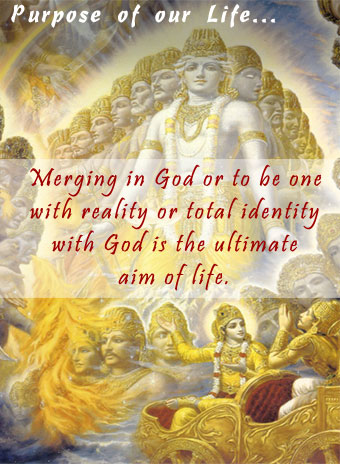 |
One example: Any letter you post should have two addresses, one to whom you have written, and another, your own address so that if by any chance it doesn't reach the addressee, it can at least come back to you. But, if the addresses are not written, it will go to the dead letter office. Similarly, you should know where you come from and where you go from here.
Merging in God or to be one with reality or total identity with God is the ultimate aim of life. "Punarapi jananam punarapi maranam punarapi janani jathare s'ayanam" (life is a continuous cycle of repeated births and deaths). After death one has to go back to the womb of the mother and be born once again. It is only life after life.
But spirituality helps you, so to say, not to be born. Having departed, you don't have to die once again by having another birth. You take medicine so that you don't have to fall sick once again. Death should take you to immortality.
One more example: Once a prisoner was released after the completion of his term. The jailor said to him, "Pack your baggage and leave!" The prisoner replied, "Sir! Why should I take the trouble of carrying this luggage? Anyhow I will come back soon." It implies that he will commit some crime again and is prepared to put himself behind bars. Our life should not be like this. It should be like the newspaper. Today's newspaper is not read tomorrow. Why? Because today's newspaper is tomorrow's waste paper. You should always remember that you are from God, in God and will be back to God.
Prof. Anil Kumar: Swami! I find many people sad. Even people who are rich and in high positions are also not happy. Why is this so? Please tell us what we need to do?
Bhagavan: There are two reasons for this. People are sad thinking of the past. Don't you know that the past is beyond recovery? Having walked all along and gone through several things, why do you need to look back? Past is past; don't brood over the past.
The second reason for sadness is worry about the future. Where is the guarantee that you will survive until your plans are realised? Do you know what will happen to you in the next moment? What is destined and bound to happen will happen in its own course. Everything goes according to God's will. Why do you worry? The future is uncertain.
Suppose you go on accumulating money with the idea of educating your son and sending him abroad, where is the guarantee that he will study well? So don't think of the past and the future. Live in the present and be happy. This is not ordinary present; this is omnipresent.
 |
 |
 |
 |
One simple example here: In the past it was a tree. In the present you have a seed of that tree. In the future it grows into a tree. So the present is the result of the past; it is the foundation of the future. Keep this in mind. You will then never worry or feel sad.
There is another reason for sadness, and that is unlimited desires. For example, if you drop a piece of cloth, it falls down. Why? Because of its weight. But if it is cotton, it never goes down, instead it goes up. Since it is light it lifts itself up. The man on the moon loses his weight. Having been a householder for fifty years you should be totally detached. A grahasta, householder, should become a vanaprastha, recluse and finally, a sanyasi, renunciant. If your desires are less, you will be happier. "Less luggage, more comfort - make travel a pleasure" is the slogan of the railways.
The more you love God the more will you be happy. For this, faith is essential.
Where there is Faith, there is Love.
Where there is Love, there is Peace.
Where there is Peace, there is Truth
Where there is Truth, there is God.
Where there is God, there is Bliss.
It begins with faith and ends in Bliss.
Prof. Anil Kumar: Swami! How am I to know that I am nithya, eternal? I undergo difficulties; I notice many changes all around. How can I feel that I am eternal?
Bhagavan: A simple illustration: There was a poor villager who had a wife and a son. He found it difficult to make both ends meet. To improve his lot, he went to another town leaving his family behind to take up some business there.
One day he had a dream in which he was a rich man and had five sons. After some time, he woke up. When he returned to his native village, he was informed by his wife that his only son had died as he couldn't bear separation from his father. This man stood unruffled. His wife then asked him, "Are you not sad over the death of your only son? What has happened to you?" The poor villager replied, "I know about the tragedy. But I am at a loss to know for whom I should cry. Should I cry for the loss of five sons in the dream there or for the death of the son here?"
Similarly, you should know that one is a day dream and the other is a night dream. One doesn't exist, when the other is present, but you are present in both the states. You are the experiencer in the waking and dream states.
 |
 |
 |
Then what is the difference between the day dream and the night dream? The former is bound by factors such as the kaya, body, kala, time, karya, action, karana, reason, and kartavya, duty.
Suppose, you have gone to Guntur, and you know when, why and how. You went by bus, which took ten hours to reach your place, to share with your wife all your experiences as part of your duty. But, in a dream these factors do not exist. How do you travel, and how long does it take to reach your place while your body remains lying in the bed? So there are differences between the two states, but you are present in both. So you are nithya, eternal.
Prof. Anil Kumar: Swami! God is the creator. He should have created only happiness. Why did He create difficulties and troubles? Pardon me, Swami, for putting this question.
Bhagavan: Without difficulties you can never get happiness. 'Na sukhat labhyate sukham - You do not get happiness out of happiness. No hardships end up in hardship. Without troubles, you will never know the value of pleasure.
For instance, you are spending your time in this air-conditioned room. If you have to know its value, what you should do is to come out and go round in the open space in bright daylight.
You should face all the difficulties as tests of God. A devotee should welcome troubles which are the tests of his devotion and faith. How do you expect a student to be promoted to the next higher class without facing a test? Otherwise, he remains in the same grade. |
Even a mother would not be able to love her child, if there is no death in her family. Here is an orange fruit. This has an outer bitter skin. But within it you find sweet juice. So, both good and bad coexist. The bitter skin protects the inner sweet juice.
Another thing you notice is that a thing that gives you happiness now may make you unhappy later. Similarly, an unhappy thing now may make you happy later.
So, nothing gives you absolute happiness or unhappiness. A woollen coat in winter makes you happy, but in severe summer it makes your life unpleasant. So also a heater in winter makes you warm but in summer it same equipment makes you very uncomfortable.
 |
 |
 |
Therefore, happiness and unhappiness depend on the time, circumstances and position. Pleasure is an interval between two pains. Pain is an interval between two pleasures. If you think of the difficulties and the intensity of suffering in times of sadness the pain doubles. In bad times, you should think of those days and moments when you were happy. Then, the intensity of suffering decreases.
You should face all the difficulties as tests of God. A devotee should welcome troubles which are the tests of his devotion and faith. How do you expect a student to be promoted to the next higher class without facing a test? Otherwise, he remains in the same grade.
Can a doctor diagnose his patient's disease, prescribe medicine and treat him without testing?
How do you expect crude gold to shine unless it is burnt, hammered and polished so as to be shaped into an ornament? But, if you set some precondition that the gold should not be hurt or burnt and yet you want a shining jewel, will the goldsmith ever be able to make it?
You also know how you get sugar. The sugarcane must be crushed and the juice must be heated and processed so as to make sugar; otherwise, it is impossible to extract sugar. You know how an earthen pot and a slate are made: The clay must be burnt repeatedly in order to transform it into a pot which you lift and carry on your head. Before the clay is made into a vessel, it is trodden and trampled by anybody and everybody. The pot does deserve a place over our head because the clay has allowed itself to be burnt and processed. So, you should not be afraid of difficulties in life.
Atma is beyond good and evil, and nothing can touch or injure it. Being a witness, Atma transcends duality. Notice this little example: The lotus flower blooms in water and mud. Without these, there is no way it can exist. But, neither water nor mud sticks to the lotus. Mud represents samskaras of past lives, and water, the fruits of present actions; the flower of the soul is beyond past and present. |
In the epic Mahabharata, Kunti prayed to Krishna to give her sons and herself more difficulties so that they can think of Him unceasingly and fervently. Hence, both good and bad are created by God for your redemption and liberation.
Prof. Anil Kumar: Swami! From where has evil come? Do you say that the mind is the source? Then, what is it that transcends both, good and evil? How is evil to be eliminated? Kindly enlighten us.
Bhagavan: Evil is not related to the mind. Rather it stems from samskaras, previous accomplishments.
The mind is full of thoughts. That is why it is said, sankalpa vikalpatmakam manah - the mind is essentially made of determinations and negations. Being hard like wax, the mind softens with a little heat. In that state anything and everything sticks to it. When wax is thrown into fire, it melts completely.
 |
Attachment and hatred stick to the mind only when it is in the soft state. When the mind is melted away, nothing attaches itself to it. Then how can the mind liquefy away completely? Even as fire melts away the wax fully, jnana, supreme wisdom, dissolves away the mind.
Atma is beyond good and evil, and nothing can touch or injure it. Being a witness, Atma transcends duality. Notice this little example: The lotus flower blooms in water and mud. Without these, there is no way it can exist. But, neither water nor mud sticks to the lotus. Mud represents samskaras of past lives, and water, the fruits of present actions; the flower of the soul is beyond past and present.
Desires which are bounded by time constitute nerpu, skill or craft, while Divinity mined from the recesses of the heart is koorpu, arrangement or synthesis. In other words, nerpu is pravrtti, outward-oriented, and kurpu is nivrtti, inward-oriented. If nerpu is a matter of the mind, koorpu concerns the heart.
A small example: For irrigating the fields, a water lift is used; it bails out water. A long wooden beam is laid across a well with a heavy stone tied at one end with a rope, and a bucket hanging from the other end. When the bucket goes down deep into a well or a canal, it gets filled with water. At that time, the heavy stone goes up as in a seesaw or a balance.
The stone represents desires, and hence the heaviness. This is nerpu or previous accomplishment. But, the bucket is not like that. It sinks deep into the well of the heart, and fills itself with the water of divinity. This is koorpu.
Are there any games without a ground to play them in or a song without a rhythm to it? The bird comes out of an egg, and the tree from a seed. Likewise the nature of atma and humanness are reciprocal, and supplement each other. Then, not taking note of evil is the way to do away with them. Consider them as illusions. That would be fine.
Dear Reader, did this article inspire you in any way? Would you like more of such conversations with the Divine? Please share with us your reflections by writing to h2h@radiosai.org mentioning your name and country. Thank you for your time.





